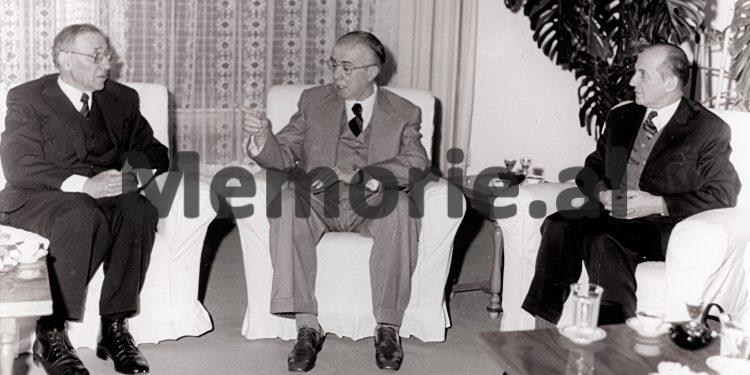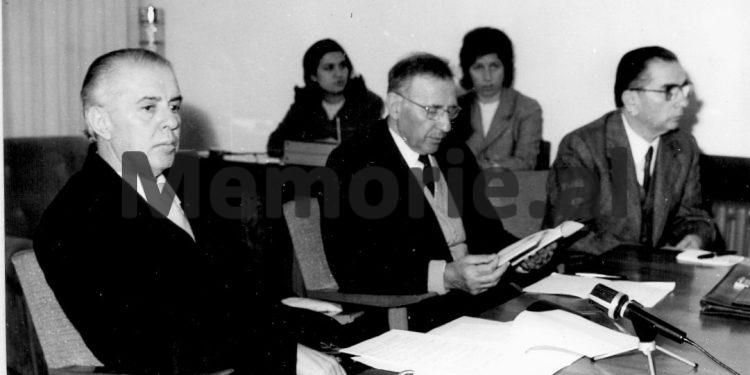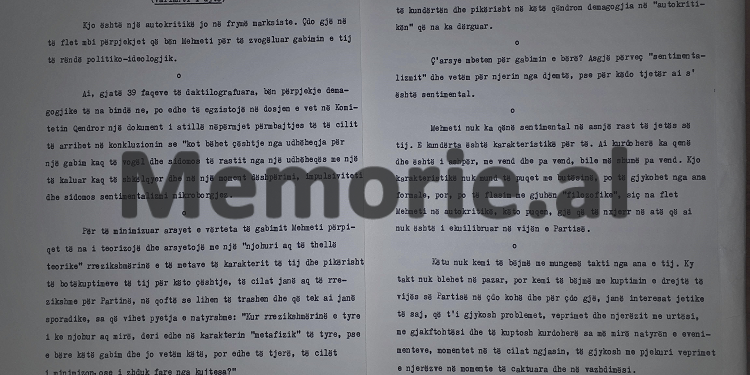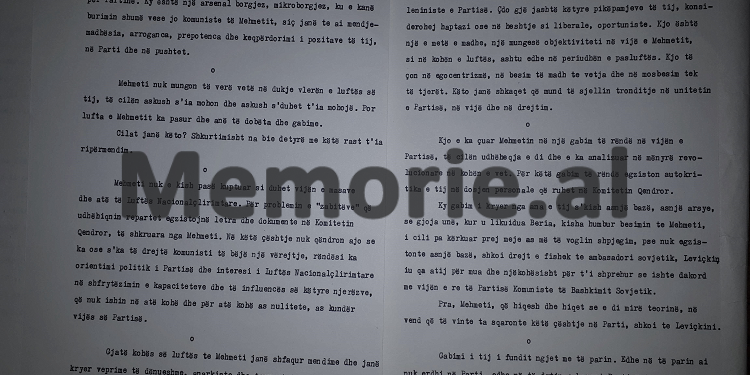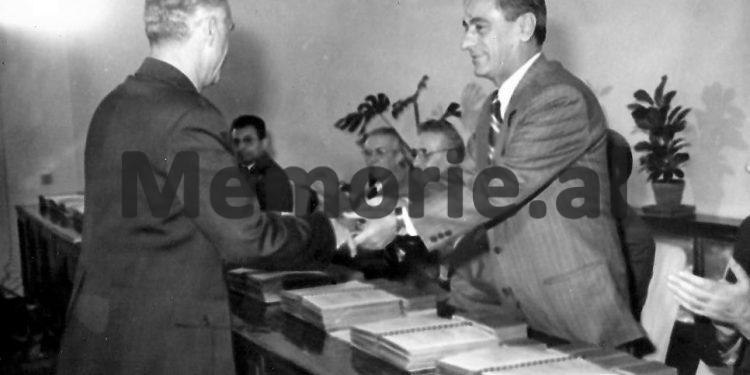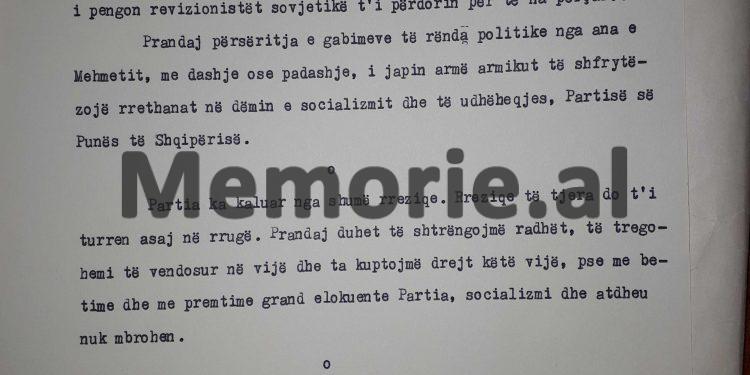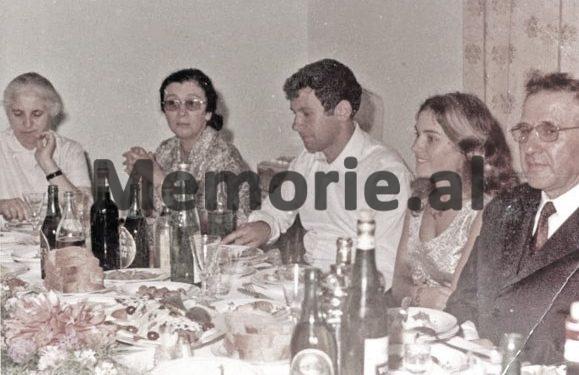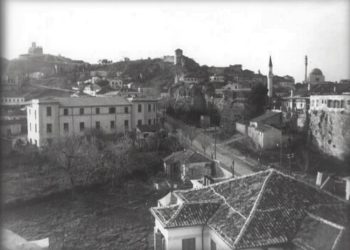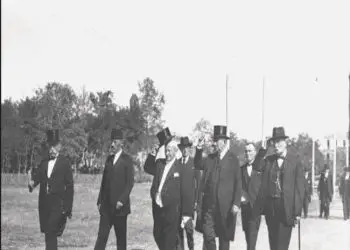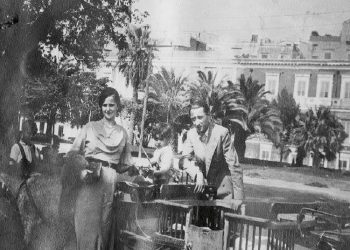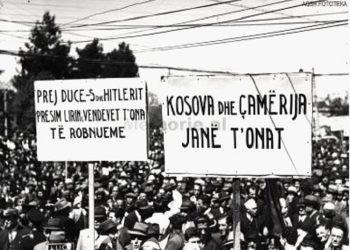Dashnor Kaloçi
Part twenty-three
Memorie.al publishes some documents issued by the Central State Archive (fund of the former Central Committee of the ALP), where there is a voluminous file with archival materials which bear the logo ‘Top secret’, which belong to the period of years 1981-1982, with reports, reports, evidence, information, minutes of the meetings of the Politburo and the secretariat of the Central Committee of the ALP, etc., starting from what was held to review and analyze the self-criticism of the former Prime Minister Mehmet Shehu in December 1981, for allowing the engagement of his son, Skënder, “with a girl who had some political fugitives in her family circle”, the marathon meeting of the Politburo on the afternoon of December 17 his year that continued until the late hours of that night, where that problem was discussed with the debates and discussions of all members who “crucified” former Prime Minister Shehu, the meeting of the morning of December 18, after the news that Prime Minister Mehme t Shehu had killed himself, the marathon meeting of the Secretariat of the Central Committee of the ALP on September 20, 1982, with the topic: “Analysis of serious mistakes of Kadri Hazbiu, committed during the period when he was deputy minister and minister of Internal Affairs “, where Enver Hoxha initially launched accusations against Kadri Hazbiu, luring him as a” loyalist of the Party “, (in order for him to” open the heart of the Party “, speaking against former Prime Minister Mehmet Shehu) , where at the beginning of his speech, Enver said: “After the coup in the army, we discovered the traitorous group in economics of Abdyl Këllez, Koço Theodhos and Kiço Ngjela with friends. We also discovered this group here; it was not discovered by the State Security. The same can be said about the discovery of the group of Fadil Paçrami, Todi Lubonja and a number of other people connected with them, such as Ismail Kadareja with friends, the Security did not reveal, but that hostile work was discovered by the Committee Central ”, etc.! All these and other documents with the logo ‘Top secret’, will be published in several issues in a row, exclusively by Memorie.al
Continued from the previous issue
The ‘Top Secret’ document with the correspondence between Enver Hoxha and Mehmet Shehu on October 19 and 28, 1981, after the self-criticism of former Prime Minister Mehmet Shehu, sent to Enver Hoxha and the Politburo of the Central Committee of the ALP, regarding the engagement of to his son, Skënder, with “a girl with a very bad political make-up”.
Top secret
“Draft-self-criticism” (“First self-criticism”) that Mehmet Shehu sent to comrade Enver Hoxha and “Autocriticism” (second variant) to comrade Enver Hoxha and comrades of the Politburo of the Central Committee as well as the minutes of the meeting Politburo of the Central Committee of the ALP, dated 17 – 18 December 1981: For the analysis of the serious mistake made by the former member of the Politburo, Mehmet Shehu, regarding the engagement of a boy with a girl with a very bad political composition .
The archival document with Enver Hoxha’s letter dated November 13, 1981, where he responds and reacts to the second version of Mehmet Shehu’s self-criticism, regarding “his mistake, for the engagement of his second son, Skënder, to a girl with very bad political composition”.
AFTER READING MEHMET’S SELF-CRITICISM
(Second variant)
This is a self-criticism not in a Marxist spirit. Everything in it speaks of Mehmet’s efforts to reduce his grave, political-ideological error.
He, during the 39 typed pages, makes a demagogic attempt to convince us, as well as to have in his file in the Central Committee, such a document, through the content of which, to reach the conclusion that: leadership, for such a small and especially accidental mistake by a leader with such a brilliant past and in a moment of despair, the eighth impulsive and especially the micro-bourgeois sentimentality”.
In order to minimize his reasons for error, Mehmeti tries to theorize and justify to us with such “deep theoretical knowledge”, the dangerousness of the flaws of his character and precisely of his worldviews on these issues, which are so dangerous for the Party, if they are left to thicken and are sporadic to him, that the natural question arises: “When you knew their danger so well, even in their ‘metaphysical’ character, why did you do it?” this mistake, and not only this, but also others, which he minimizes or erases from memory at all ”?!
Wanting to elaborate on “philosophical colors”, what he has and what prompted him to make mistakes in the line, he manages to prove the opposite, and this is exactly the demagoguery in “self-criticism” that he has sent us.
What are the reasons for the mistake made? Nothing but “sentimentality”, and only for one of the boys, why for anyone else, he is not sentimental?!
Mehmeti has not been sentimental in any case of his life. On the contrary, it is characteristic of him. He has always been and is tough with place and without place, even more out of place. This characteristic cannot be reconciled with gentleness, if judged formally, but if we speak in philosophical language, as Mehmeti tells us in self-criticism, these converge, which leads to what: he is not balanced in the line of the party.
Here we are not dealing with a lack of tact on his part. This tact is not bought in the market, but we are dealing with the true meaning of the Party line at any time and for everything, are its vital interests, to judge problems, actions and people with wisdom, composure and always understand as well as possible the nature of events, the moments in which they occur, to judge with maturity the actions of people in certain moments and continuously.
How is it possible that Mehmeti, who “held the flag” against “necks”, “against mustaches”, in youth, etc., is so sentimental about the immoral and immoral life of his son in question, that he led scandals in the people, he was called by the party, his ears were drawn and when his friends came they informed him, unfortunately he did not expect these with pleasure, even with diffident?
How can Mehmet be so sentimental, in front of his son’s moral acts, and not show a thread of sentimentality for the Party, which is being discredited through this son’s acts and Mehmet’s attitudes towards this situation? This “sentimentality” must have deeper sources than those explained by Mehmeti.
Nothing explains this sentimentality he claims.
Then, why did he go from rain to hail, from debauched life, to preparing and realizing a marriage with a very reactionary family and known hostile attitudes?!
Mehmeti does not analyze these situations correctly, as shown by the theory. There are people in the world who learn a lot about our theory, and even know it well, but not only are they against it, but they also fight it.
Mehmeti focuses on the only mistake he made in relation to the boy’s engagement, but forgets that during his life, he made other mistakes as well. He calls his attitudes with his colleagues at work sporadic, and even “understands and corrects them, so that he even falls asleep”. But, surprisingly, he quickly forgets these mistakes and repeats them. These in turn have become a line against the line and moral and political ideological norms of the Party.
It is not true that my friends, and not only me, did not point out his mistakes when he made them, and many times we even criticized them harshly. But these mistakes, these attitudes, these actions of his, have serious consequences and become very dangerous, when you are in a task of such importance, with which Mehmeti is charged.
Mehmeti philosophizes these issues, but brings them out as insignificant, almost ordinary things, until he fails to say that my friends should not notice me, why I am impulsive, etc., etc., that my work and struggle, are “so colossal” that these are pettiness on the part of comrades, who are publicly attacked, who are considered anti-party and Trotskyists, when they are not?!
These issues speak of foreign worldviews on his part for the Party. This is a bourgeois, micro-bourgeois arsenal, where they have the source of many of Mehmet’s non-communist vices, such as his: arrogance, arrogance, arrogance and abuse of his positions, in the Party and in power.
Mehmeti does not fail to point out the value of his war, which no one denies and no one should deny. But Mehmet’s war also had its weaknesses and mistakes.
What are these? In short, it is our duty to mention it again.
Mehmeti had not properly understood the line of measures and that of the National Liberation War. For the problem of the “officers” who led the wards, there are letters and documents in the Central Committee written by Mehmeti. In this matter, it does not stand that the communist has or has no right to make a remark, what matters is the political orientation of the Party and the interest of the National Liberation War in using the capacities and influence of these people, who were not at that time and for that time, neither nullities, nor against the Party line.
During the time of Mehmet’s War, reprehensible thoughts, actions, and anarchist and terrorist acts were expressed that harmed the War and did not help it. In Mehmeti, leftism, in thought and action, has always been considered the true Marxist-Leninist line of the Party. Anything outside of these views was considered, openly or tacitly, as liberal, opportunistic. This is a major flaw, a lack of objectivity in Mehmet’s line, both during the war and in the post-war period. This leads to egocentrism in great self-confidence and distrust in others. These are the causes that can bring shocks to the unity of the Party, in line and in direction.
This has led Mehmet to make a grave mistake in the line of the Party, which the leadership knows and has analyzed in a revolutionary way in its time. For this grave error, there is his self-criticism in the personal file kept in the Central Committee.
This mistake made by him had no basis, no reason, that allegedly I, when Beria was liquidated, had lost faith in Mehmeti, who without asking me even the slightest explanation, why there was no basis, went straight to the cartridge of the Soviet ambassador, Levichkin, cried to him, to me and at the same time to express that he agreed with the new line of the Communist Party of the Soviet Union.
So Mehmet, who is removed and removed because he knows the theory well, instead of coming to clarify this issue in the Party, went to Levickin.
His last mistake resembles the first. In the first, he did not come to the Party, and in the second, he forgot to ask the Party! For his first mistake, Levickin came and informed me that he knew the danger, if he did not denounce Mehmet. Mehmet’s last mistake, I learned from the road.
However, even then, even now, Mehmeti should know that the Khrushchevites, knowing these events, and only the right leadership of the Party, prevent the Soviet revisionists from using them to divide us.
Therefore, the repetition of serious political mistakes by Mehmet, intentionally or unintentionally, gives weapons to the enemy, to take advantage of the circumstances, to the detriment of socialism and the leadership of the Albanian Labor Party.
The party has gone through many dangers. Other dangers will befall her on the road. That is why we must tighten our ranks, be firm in the line and understand this line correctly, that with oaths and promises, ‘grand eloquent’, the Party, socialism and the homeland, are not protected./Memorie.al
November 13, 1951
Enver
The next issue follows




